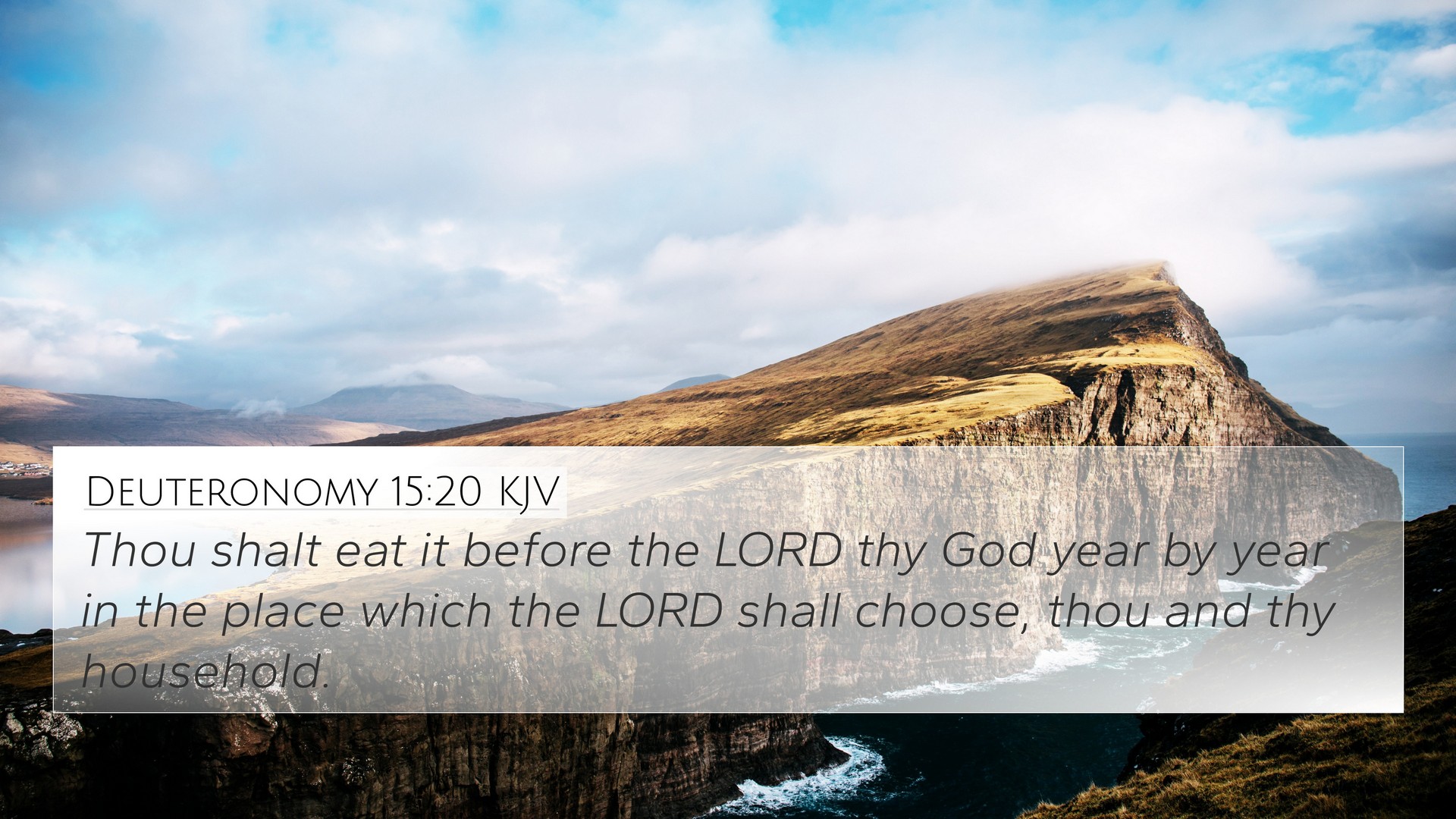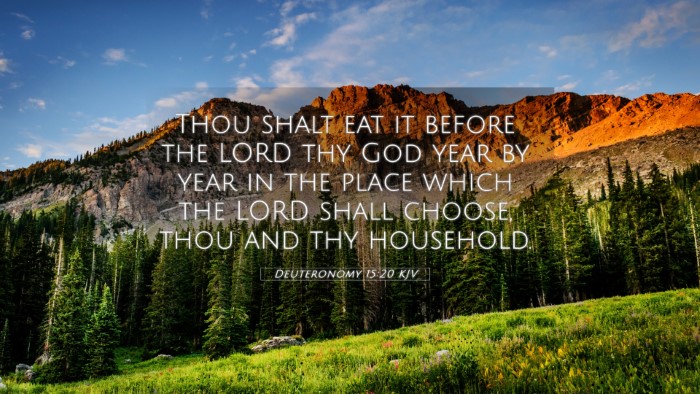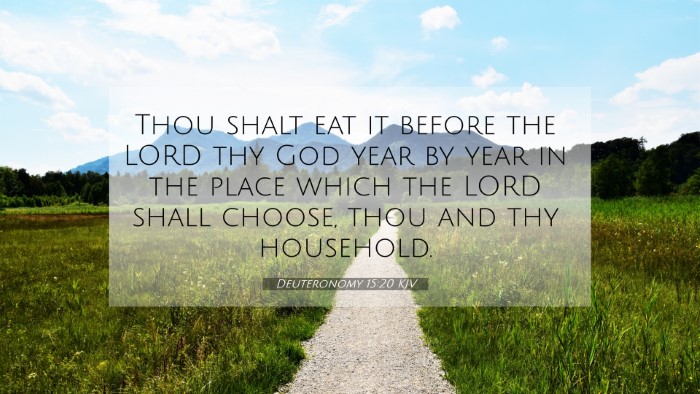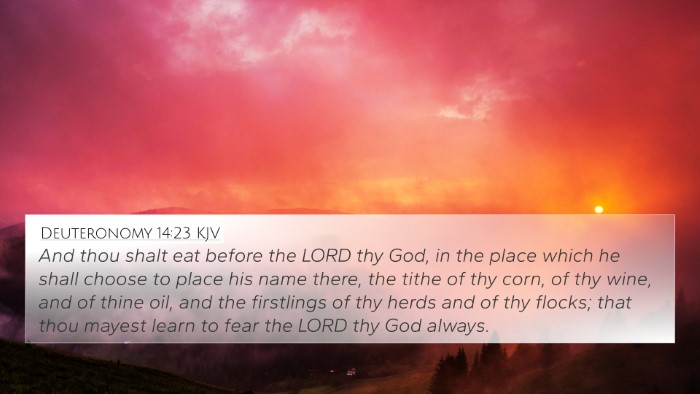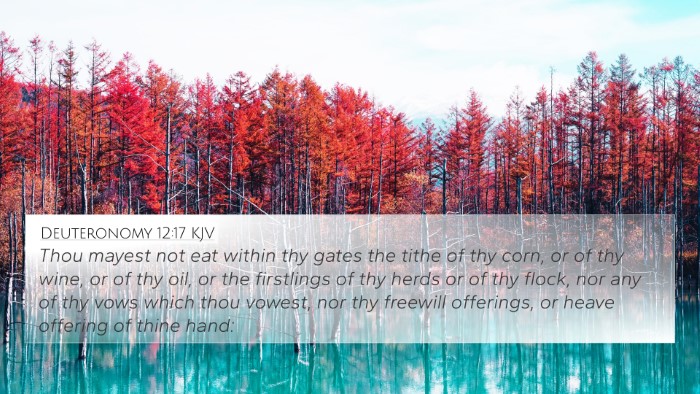Understanding Deuteronomy 15:20
This verse encapsulates important themes of worship, sacrifice, and the covenant relationship between Israel and God. In Deuteronomy 15:20, God instructs His people regarding their offerings, particularly emphasizing the quality of the sacrificed animals which should be "without blemish." This reflects an essential principle in the system of sacrifices that undergirds the Mosaic Law.
Verse Context
Deuteronomy 15:20 states: "And you shall eat it before the LORD your God year by year in the place which the LORD chooses, you and your household, and you shall rejoice before the LORD your God." This command underscores a communal aspect of worship, wherein the act of eating and rejoicing before God serves as a celebration of His blessings.
Commentary Insights
-
Matthew Henry Commentary:
Henry emphasizes that the directive to eat before the Lord signifies a joyful union between the worshipper and God, where the sacrifice is not merely a ritual but a moment of reflection on divine generosity and favor.
-
Albert Barnes Notes:
Barnes highlights the importance of presenting the best offerings, which symbolizes giving God the honor that is due to Him. It fosters a deeper relationship between the individual and the Creator through acts of faith and obedience.
-
Adam Clarke's Commentary:
Clarke draws a connection between this ritual and the broader themes of community and covenant-keeping, asserting that sharing in the sacrificial meal is a reflection of God's covenant promise to His people.
Bible Verse Cross-References
To better understand the implications of Deuteronomy 15:20, here are related scripture references:
- Exodus 12:8: Discusses consuming the Passover lamb, emphasizing the sacrificial feast aspect.
- Leviticus 7:15: Refers to the fellowship offering eaten in the presence of the Lord.
- 1 Corinthians 10:21: Paul reminds believers about the sharing of meals in relation to fellowship with God.
- Deuteronomy 12:18: Specifies the command to eat in the presence of the Lord with joy.
- Psalm 116:17: Reflects the idea of offering thanks as an act of worship.
- Philippians 4:18: Relates to the idea of acceptable offerings to God through the support of the ministry.
- Hebrews 13:15: Encourages believers to offer sacrifices of praise as a spiritual service.
Thematic Bible Verse Connections
When examining Deuteronomy 15:20 within the broader biblical narrative, several themes emerge:
- Worship and Sacrifice: The act of sacrificing and eating in God's presence illustrates worship as both an individual and communal act.
- Covenant Relationship: The requirement for the offerings to be pure serves as a reminder of the holiness of God and the call for His people to reflect His character.
- Joy in Worship: The emphasis on rejoicing signifies that worship should be a celebration of God’s goodness and provision.
Comparative Bible Verse Analysis
Through the lens of comparative analysis, Deuteronomy 15:20 can be seen alongside several other scriptural references:
- Malachi 1:8: There is criticism of offering defective animals to God, reinforcing the call for purity in offerings.
- Matthew 5:23-24: Jesus speaks on the importance of coming to terms with one another before offering gifts, tying communal relationships to worship practices.
- Romans 12:1: Paul encourages believers to present their bodies as living sacrifices, urging that every believer's life should be an act of worship.
Conclusion
In summary, Deuteronomy 15:20 is rich with meaning regarding worship, community, and the character of the offerings made to God. By examining this verse alongside related scriptures and commentaries, we garner a deeper understanding of its significance within the tapestry of biblical themes and teachings.
Cross-Referencing Biblical Texts
For those seeking to understand how Bible verses relate to one another, employing tools for Bible cross-referencing can be invaluable. Utilizing a Bible concordance, a cross-reference Bible study, or a Bible cross-reference guide can enhance one's study and interpretation, providing a richer comprehension of the scriptural narrative and its interconnectedness.
Exploring Inter-Biblical Dialogue
Lastly, engaging in inter-Biblical dialogue through cross-referencing can reveal profound insights into God's overarching narrative. As you explore connections between Old and New Testament scriptures, you will discover the continuity of God's covenant relationship with humanity, the sacrificial system leading to Christ, and the joyous response that should characterize our worship experience.
